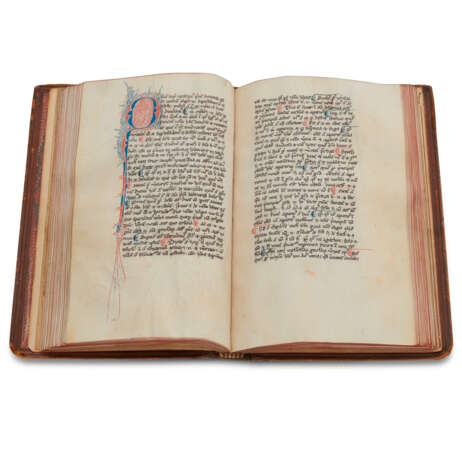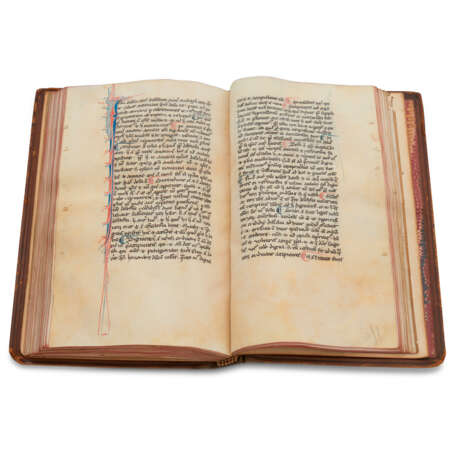ID 870717
Lot 37 | Aristotle (author); William of Moerbeke (translator) (1215-35 - c.1286)
Valeur estimée
£ 15 000 – 20 000
Ethica Nicomachea, in the Latin translation of William of Moerbeke, decorated manuscript on vellum [Paris?], dated 15 January 1282
An exceptional survival of the 'new' Latin translation by William of Moerbeke of Aristotle's best-known work on ethics, once in the collections of the College of Navarre, Paris, whose library rivaled that of the Sorbonne.
185 x 132mm. ii + 90 + ii leaves, collation: 18, 26, 310, 44, 512, 64, 72, 8-98, 106, 1110, 12-136, 30 lines in a minute, heavily abbreviated calligraphic hand, ruled space: 112 x 76mm., rubrics in red, paraphs alternately in red or blue, penwork initials in red or blue with flourishing of the opposite colour throughout, larger initials opening the Books (lacking opening, and two further leaves after ff.23 and 60, f.32 with a marginal slice in the vellum, once repaired but now missing the repair, edge of f.64 cut away, a few wormholes, especially to flyleaves, occasional staining and smudging but generally in excellent condition). 19th?-century blind-tooled calf, marbled endpapers (edges and spine a little scuffed).
Provenance:
(1) The Library of the College de Navarre, founded by Jeanne de Navarre, one of the colleges of the historic University of Paris, rivalling the Sorbonne and renowned for its extensive collections. Likely its shelf-mark XXVI repeatedly inscribed in a medieval hand on upper and lower flyleaves. The colophon on f.90 reads: 'Explicit Liber Ethychorum nove translationis aristotilis [sic] stragelite [i.e. Stagira] actum anno domini 1281 in festo S. mauri', i.e. 15 January (but actually 1282 as the liturgical year would not yet have finished). This colophon, and the missing opening, is mentioned explicitly in J. Echard, Scriptores Ordinis Praedicatorum, I, 1719, p.390: 'Paris. in Navarr. codex est MS memb. [...] scilicet Libri Ethicorum decem. Foliolum primum avulsum [...]', and again later in 1750 by Fr. Jo. Fran. Bernardus Maria, De Rubeis Ordinis Praedicatorum [...], 1750, p.238: 'Parisiensis Navarraeus Codex praestat libros Ethicorum decem cum hac nota in calce [...]'. The College was suppressed during the French Revolution, its library dispersed and archives lost. The manuscript is mentioned as 'once belonging' to the College of Navarre in Histoire littéraire de la France, XXI (1847), p.147. For a history of the College and its Library, see A. Franklin, Les anciennes bibliothèques de Paris, I, 1867-73, pp.393-404.
(2) 18th-century pentrials on the flyleaves and a ?19th-century inscription in French 'Aristoteles / Ecrit en 1280'.
(3) Goodspeed's Book Shop, Boston, Mass., The Month at Goodspeed's, vols. 8-9 (1936), p.147.
Content:
Aristotle, Ethica Nicomachea, ff.1-90: beginning in Book I, ch.IV: 'Nomine quidem igitur fere a plurimis confessum est' (f.1); Book 2 (f.8v); Book 3 (f.14v, lacking the end of ch.XXII); Book 4 (f.24, lacking beginning, starting in ch.II '[...] sed ut necessarium, ut habeat dare'); Book 5 (f.33); Book 6 (f.43v); Book 7 (f.50, lacking the end of ch.XIV); Book 8 (f.61, lacking beginning, starting in ch.I '[...] humana et convenentia ad mores'); Book 9 (f.70v); Book 10 (f.79v).
Manuscripts of Aristotle are extremely rare on the market, especially ones with such impressive institutional provenance as the present copy. The Nicomachean Ethics is widely considered to be one of the most important of philosophical works: in it Aristotle outlines the theory of virtuous character based on the idea of finding a golden mean, along with valuable insights about friendship, courage, generosity and justice. Its influence in the European Middle Ages cannot be overstated, and one of the primary translations of the text was carried out - apparently at the request of Thomas Aquinas - by the Flemish Dominican William of Moerbeke, prolific translator of philosophical, medical and scientific texts. Moerbeke died in c.1286, and the colophon in the present manuscript describes the content as 'nove translationis'.
Special notice
No VAT on hammer price or buyer's premium.
| Lieu d'origine: | Europe de l'Ouest, France, Europe |
|---|---|
| Catégorie maison de vente aux enchères: | Manuscrits médiévaux et de la Renaissance |
| Lieu d'origine: | Europe de l'Ouest, France, Europe |
|---|---|
| Catégorie maison de vente aux enchères: | Manuscrits médiévaux et de la Renaissance |
| Adresse de l'enchère |
CHRISTIE'S 8 King Street, St. James's SW1Y 6QT London Royaume-Uni | |
|---|---|---|
| Aperçu |
| |
| Téléphone | +44 (0)20 7839 9060 | |
| Commission | see on Website | |
| Conditions d'utilisation | Conditions d'utilisation |






